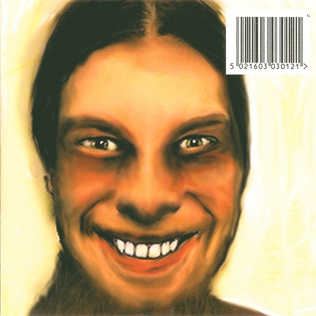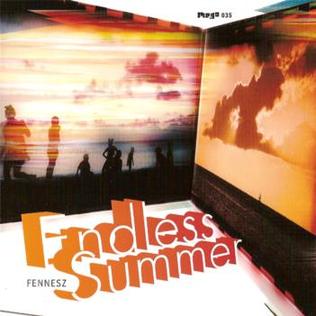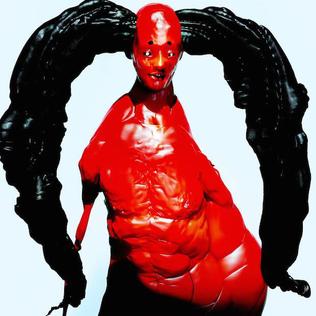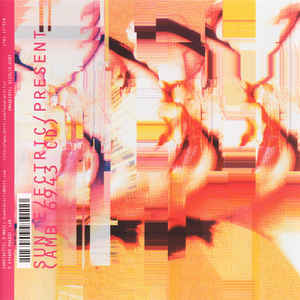Background
Oval received both praise and controversy for its styling methods, such as literally deconstructing music and digital audio by using exacto knives, paint, and tape to damage the surfaces of compact discs, only to stitch the sound back together in loops of melody punctuated by the disc's physical skips. [3] On its initial release, Select noted in their review that Oval "sound unlike any other combo" on 94 Diskont. [4] The review went on to note that group have been described in desperation as techno and critiqued this reference stating "try dancing to the sort of erratic pulsing and hiccuping that comes over like the read-out from a dying alien's electrocardiograph". [4]
94 Diskont was released as a companion piece to Oval's previous album, Systemisch . The album's centerpiece is "Do While," a 24-minute track originally composed for the group's 8-channel, 128-speaker modular sound installation named Wohnton (translates into home tone) in a stereo mixdown. The installation was shown throughout Europe between 1994 and 1996 on various occasions, ranging from art exhibitions to techno raves. [5] A radio edit of the song, "Do While ⌘X", is also included on the album. The US pressing by Thrill Jockey adds two additional songs and, on vinyl, moves "Do While ⌘X" up in the running order to appear directly after "Do While", instead of closing the album.
Both US and international vinyl versions of the album came with a remix LP that contains remixes by Mouse on Mars, Scanner, Cristian Vogel, and Jim O'Rourke. [5]
Reviews and influence
Dave Morrison of Select gave the album a four out of five rating, first mentioning the group's unorthodox method of obtaining the sounds on the album, then noting that "this out-on-a-limb approach wouldn't mean a thing if the results weren't so brilliant." [4] The Wire placed the album at number five on its 1995 of top albums of the year. [7]
Ben Tausig of AllMusic awarded the album five stars and stated, "94 Diskont is undoubtedly a standout in the field of electronically advanced, glitch-heavy music." [6] In their 1998 list of "100 Records That Set the World on Fire (While No One Was Listening)", The Wire wrote of the album: "From nothing but digital detritus, Oval construct a resonant holism of pure crystalline beauty. The balance of this disc is given over to brief excursions into textural exposition, pushing back the boundaries of sound as music." [8]
In a 2003 feature, the webzine Pitchfork placed 94 Diskont at number 47 on its list of the top 100 albums of the 1990s. Mark Richardson of Pitchfork declared, "Sounds appear as multi-layer holograms, with both sources and ghosted copies simultaneously vying for attention, a piece of sonic trickery used to create some of the most serene and aquatic music of the '90s." [9] Richardson would later state in a 2016 piece that 94 Diskont "was the first sound of a new future". [1] In 2016, Pitchfork named 94 Diskont the seventh best ambient album of all time. [2]

Ambient music is a genre of music that emphasizes tone and atmosphere over traditional musical structure or rhythm. It is often "peaceful" sounding and lacks composition, beat, and/or structured melody. It uses textural layers of sound that can reward both passive and active listening and encourage a sense of calm or contemplation. The genre is said to evoke an "atmospheric", "visual", or "unobtrusive" quality. Nature soundscapes may be included, and the sounds of acoustic instruments such as the piano, strings and flute may be emulated through a synthesizer.

Christian Fennesz is an Austrian producer and guitarist active in electronic music since the 1990s, often credited mononymously as Fennesz. His work utilizes guitar and laptop computers to blend melody with treated samples and glitch production. He lives and works in Vienna, and currently records on the UK label Touch.

...I Care Because You Do is the third studio album by the British electronic music artist and producer Richard D. James under the alias of Aphex Twin. It was released on 24 April 1995 through Warp Records and contains material recorded between 1990 and 1994. It marked James's return to a beat-driven sound following the mostly ambient album Selected Ambient Works Volume II (1994), and combines abrasive rhythms with symphonic and ambient elements. The cover artwork is a self-portrait of James.
Glitch is a genre of electronic music that emerged in the 1990s which is distinguished by the deliberate use of glitch-based audio media and other sonic artifacts.

Richard D. James Album is the fourth studio album by the British electronic music artist and producer Richard D. James under the alias of Aphex Twin. It was released on 4 November 1996 through Warp Records. It was composed by James on his Macintosh computer, and took longer to complete than his previous albums. It features fast breakbeats and intricate drum programming which draw from jungle and drum and bass. James' drum loops are paired with lush string arrangements, and ambient melodies reminiscent of his earlier work, as well as modulated vocals from James.

Matmos is an experimental electronic music duo formed in San Francisco and currently based in Baltimore. M. C. (Martin) Schmidt and Drew Daniel are the core members, but they frequently include other artists on their records and in their performances, including notably J Lesser. Apart from releasing twelve full-length studio albums and numerous collaborative works, Matmos is also well known for their collaboration with Icelandic singer and musician Björk, both on studio recordings and live tours. After being signed to Matador Records for nine years, Matmos signed with Thrill Jockey in 2012. The name Matmos refers to the seething lake of evil slime beneath the city Sogo in the 1968 film Barbarella.

Selected Ambient Works Volume II is the second studio album by the British electronic music artist and producer Richard D. James under the alias of Aphex Twin. It was released on 7 March 1994 through Warp Records. Its title follows James's debut Selected Ambient Works 85–92. Unlike that record, most of the tracks are purely ambient music, without the earlier volume's ambient techno beats. James said the music was inspired through lucid dreaming, and likened it to "standing in a power station on acid."

Mouse on Mars is a German electronic music duo formed in 1993 by Jan St. Werner and Andi Toma. Their music is a blend of electronic genres including IDM, dub, krautrock, breakbeat and ambient, featuring heavy use of organic analog synth and cross-frequency modulation. Their music also features live instrumentation including strings, horns, drums, bass, and guitar.

Amber is the second studio album by English electronic music duo Autechre, released on 7 November 1994 by Warp. It was the first Autechre album to be composed entirely of new material, as their debut album Incunabula (1993) was a compilation of older tracks.

Oval is an electronic music group founded in Germany in 1991 by Markus Popp, Sebastian Oschatz, Frank Metzger and Holger Lindmüller. The group pioneered glitch music, writing on CDs to damage them and produce music with the resulting fragments. The project has been a solo venture by Popp since the departure of other members in 1995.

TNT is the third studio album by American post-rock band Tortoise, released in 1998 by Thrill Jockey. After Jeff Parker joined the band in 1996, Tortoise recorded TNT over the course of a year with drummer John McEntire acting as producer, editor and mixing. Taking influence from their remix material of the 1990s, the band recorded the album using hard disk technology in a "forward-then-back" approach, with members individually adding parts to tracks at different stages until the tracks were completed. As with previous albums, the band members also shared instrumental roles.

Endless Summer is an album by Austrian electronic music producer and guitarist Fennesz, released on 3 July 2001 by Mego. The title was derived from the 1960s surf documentary by Bruce Brown, and is also shared with a 1974 compilation album by the Beach Boys. The album features Fennesz's melodic guitar run through digital processing and glitch textures.

Ginger is the debut studio album by Dutch electronic music producer Speedy J. Released via a joint deal between Plus 8 and Warp in September 1993, the album was the sixth release in Warp's Artificial Intelligence series, which focused on "electronic listening music" by different artists. It peaked at number 68 on the UK Albums Chart and remains Speedy J's most successful album there.

Pop is the fourth album by Wolfgang Voigt's Gas project, released on 28 March 2000 on Mille Plateaux. At the time of its release, reviews noted 'a striking left turn' in the sound, compared to other Gas releases; the album sounds considerably crisper, with a less muffled kickdrum and less of the 'underwater' quality present on other releases under the name.

Slon is the third album from the Chicago Underground Trio. The album was released in January 2004 on Thrill Jockey Records. This is their first release on Thrill Jockey, their first two albums were released by Delmark Records. The album was produced by Bundy K. Brown. The trio consists of Rob Mazurek on cornet, Noel Kupersmith on bass and Chad Taylor on drums. This is their last release with bassist Noel Kupersmith. Mazurek and Taylor have also combined as the Chicago Underground Duo and with the Chicago Underground Orchestra.

Glass Swords is the debut studio album by Scottish producer Russell Whyte under his alias of Rustie, released by Warp in 2011. The album was produced and recorded between 2008 and 2010 by Whyte, partially in his father's home in Glasgow, Scotland and partly in his own home in London, England. The album contains vocal work from Whyte as well as London based producer Nightwave.

Mutant is the second studio album by Venezuelan electronic music producer Arca. It was released on 20 November 2015 via Mute.

Reflection is the twenty-seventh studio album by Brian Eno, released on 1 January 2017 on Warp Records. It is a piece of generative ambient music produced by Eno, which plays indefinitely via an app, modulating its output at different times of the day. A pre-recorded version of the album is available on CD and vinyl, which runs for 54 minutes. Digital streaming versions of the album update on a seasonal basis. It was nominated for the 2017 Grammy Award for Best New Age Album and was released to a positive acclaim by critics.

Narkopop is the fifth studio album by Wolfgang Voigt's Gas project, the first album under the moniker in 17 years and his first on Kompakt. The album was released on 21 April 2017.

Present is the third album by German techno duo Sun Electric, released in November 1996 by Belgian label Apollo Records. The duo's first full-length studio album for the label, the album is a return to Sun Electric's more beat-oriented material and incorporates styles of dub, jungle, IDM, breakbeat and downtempo. The album artwork by The Designer's Republic features a manipulated image similar to artworks of Madonna, reflecting the melancholic, fractured sound of the album. Music critics greeted Present favourably, praising its inventive style, and some have since recognised the record as overlooked.



















